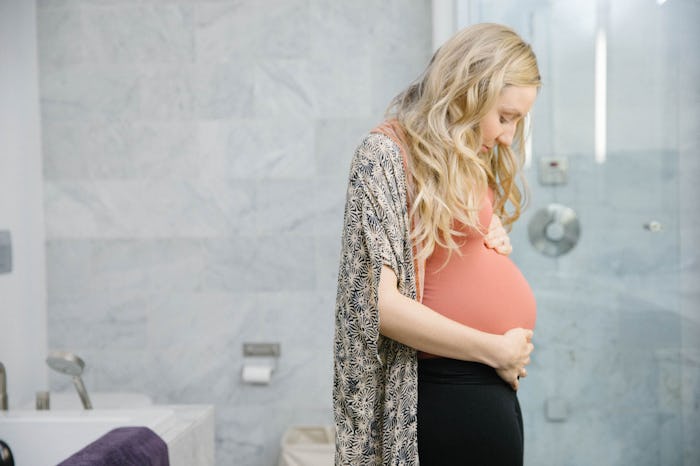Life
Here's What To Expect After You Get The Flu Shot During Pregnancy
When my sister was 18 weeks pregnant, she received the flu shot. That night, she spiked a fever of 102 degrees Fahrenheit and experienced sweating, chills, and body aches. Her husband immediately called her doctor who advised him to keep her hydrated, cool her down with ice packs, and monitor her temperature, calling if it increased — it didn't and she was fine. But experts say her reaction is uncommon — only 1 to 2 percent of people who get a flu shot will experience a fever. But what are the side effects of the flu shot during pregnancy?
"Side effects following the flu shot are the same in women who are pregnant and those who are not pregnant," Dr. Aaron Styer, OB-GYN and reproductive endocrinologist with Colorado Center for Reproductive Medicine in Boston, tells Romper in an email interview. "[They] are usually mild and resolve within 48 hours. The most common side effects include soreness at the site of the injection, fatigue, nausea, fever, headache, and muscle aches."
Styer says in very rare circumstances, patients with a prior history of severe allergic reactions to vaccines or a severe allergy to egg protein may have concerning side effects such as flushing, full body rash, shortness of breath, sweating, rapid heart rate, and fainting. "If these side effects occur, a patient should contact her healthcare provider immediately," he says.
But Styer adds that while many pregnant women voice concerns related to the safety of the flu vaccine, there are many studies that confirm the safety of the vaccine during pregnancy, including the American College of Obstetricians and Gynecologists (ACOG) and Centers for Disease Control and Prevention (CDC).
"The flu shot is completely safe to get during any trimester of pregnancy," he says. "It is safe to have the flu shot even in the first few weeks of pregnancy and even in the postpartum period when breastfeeding. There are no risks to a woman or her baby.
The CDC maintains that the flu is more likely to cause severe illness in pregnant women than in women who are not pregnant, therefore making the vaccine not only a safe, but wise choice during pregnancy. According to the CDC, getting the flu shot during pregnancy has been shown to protect both the mother and her baby from the flu for several months after birth (up to six months of age).
"In pregnancy, there are changes in the immune system, heart, and lung function that make pregnant women more prone to severe illness from the flu, which can lead to hospitalization or even death," Dr. Sherry Ross, an OB-GYN at Providence Saint John’s Health Center in Santa Monica, California and author of She-ology: The Definitive Guide to Women's Intimate Health. Period., tells Romper. "Other problems as a result of the flu include dehydration, miscarriage, and preterm labor."
If you have questions about symptoms related to the flu shot, then don't hesitate to call your healthcare provider. In addition to getting the vaccine, be sure to take other precautions to safeguard against sickness, like regularly washing your hands and avoiding close contact with anyone who is ill, Dr. Allison Hill, OB-GYN and author of Your Pregnancy, Your Way, tells Romper in an email interview.
Like any concern during pregnancy, "there aren't any silly ones" as my doctor told me during a checkup appointment. For each time you second guess making the phone call or asking a question about funky things going on down there, remember that you are growing a human being. Inside of your body. And there simply aren't enough questions on the planet to downgrade your superwoman status or the importance of your baby's health.
Check out Romper's new video series, Romper's Doula Diaries:
Check out the entire Romper's Doula Diaries series and other videos on Facebook and the Bustle app across Apple TV, Roku, and Amazon Fire TV.
